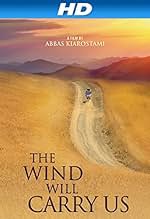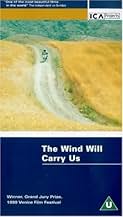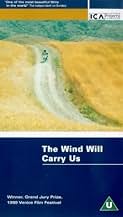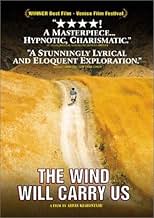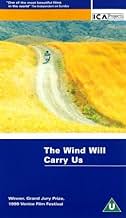IMDb रेटिंग
7.4/10
13 हज़ार
आपकी रेटिंग
अपनी भाषा में प्लॉट जोड़ेंIrreverent city engineer Behzad comes to a rural village in Iran to keep vigil for a dying relative. In the meanwhile the film follows his efforts to fit in with the local community and how ... सभी पढ़ेंIrreverent city engineer Behzad comes to a rural village in Iran to keep vigil for a dying relative. In the meanwhile the film follows his efforts to fit in with the local community and how he changes his own attitudes as a result.Irreverent city engineer Behzad comes to a rural village in Iran to keep vigil for a dying relative. In the meanwhile the film follows his efforts to fit in with the local community and how he changes his own attitudes as a result.
- निर्देशक
- लेखक
- स्टार
- पुरस्कार
- 4 जीत और कुल 7 नामांकन
फ़ीचर्ड समीक्षाएं
An amazing Abbas Kiarostami movie. Inspired by the poem of Furug Ferruhzad, in this film, the director tells the universality experienced in daily life in the Iranian countryside without getting involved in the slightest arabesque element.
When the epic simplicity of the movie is watched with admiration, you will feel sorry for the millions of dollars spent on Hollywood movies of the new era.
When the epic simplicity of the movie is watched with admiration, you will feel sorry for the millions of dollars spent on Hollywood movies of the new era.
A man out of time finds the way back in. And so, too, do we. Films about such big subjects, metaphysical, quasi-metaphysical, or near metaphysical, can't afford to be petty. So this one meanders, lays a loose and light hand on its subject, finds and follows it by a process of mutual discovery, audience and film maker wandering an unknown road, led by faith in a final destination.
Three men journey from Tehran to a tiny remote village for purposes unknown. Contrasts evolve between their urban modernity and the ageless life of the rural village. They're ostensibly there for the funeral of an ancient woman, a stranger, not a relative, who confounds their expectations by not dying. Let's just say, for the sake preserving the mystery, that they're there, in a way, to cheat death, to rob the villagers of a ritual they themselves fail to understand.
By way of first person narration, the film centers on their leader (Behzad Dourani), a man who accepts being called "engineer," but really isn't--or is he? The perspective is doubled: The world of the film narrowly revolves around him at the same time that it doesn't, claustrophobically relating everything to his solitary universe, at the same time that it encompasses the full scope of a world independent of him, thus giving the lie to his limitations, his distortions and blindness. This is narrative executed with great skill, care, and a free imagination.
Forced to wait, idle and deprived of most of his customary modern distractions, his anxiety, emptiness, and his unease surface; this is a man out of time, who resists the present and fights against the future. His one connection to the outside world, a cell phone, requires every time it goes off that he drop whatever he's doing to run to his truck and drive up to a mountain-top cemetery for clear reception, an association of technology with death concurrent with its indifference to and alienation from it, a comical escapade repeated periodically throughout to give the film a rhythm, an intrusive repetitious beat that contrasts with the natural rhythms of the village.
With nothing else to do, he gradually is tugged by and eventually succumbs to the life around him. This is the kind of movie in which a shot is held so a rooster can walk across the frame. We, too, are made to wait. While waiting, stuck in a plotless limbo, all sorts of beautiful and instructive things emerge from an apparently banal reality, if one cares to notice. There is the unassuming visual poetry of the world, the shadows on a wall of a woman hanging clothes, rolling hills of golden grass, and the organic architecture of a village molded into a hillside; and the subtlety of social interactions: the tender trust of a young boy; the engineer's yearning for a pot of milk, which finally leads him into a primeval cave-like cellar alone with a fecund young woman who refuses his money; the casualness of the birth of a neighbor woman's 10th child; the shrewish complaints of a cafe proprietor, which are answered by one her customers with implacable peasant wisdom; and so on, one scene following upon another, small miracles falling into our laps unannounced.
If only this process of poetic inference, metaphor, indirection, and openness were in more widespread use, commonly adapted, thus more fully developed, instead of the literal dry analytic "objectivity" which tyrannizes modern fictions, nails meaning as if to a cross. Here there isn't even a hint of manipulation or exploitation, not a drop of didacticism. Instead, Kiarostami achieves the difficult feat of keeping water in cupped hands. The film teaches us to observe nature by observing nature.
Three men journey from Tehran to a tiny remote village for purposes unknown. Contrasts evolve between their urban modernity and the ageless life of the rural village. They're ostensibly there for the funeral of an ancient woman, a stranger, not a relative, who confounds their expectations by not dying. Let's just say, for the sake preserving the mystery, that they're there, in a way, to cheat death, to rob the villagers of a ritual they themselves fail to understand.
By way of first person narration, the film centers on their leader (Behzad Dourani), a man who accepts being called "engineer," but really isn't--or is he? The perspective is doubled: The world of the film narrowly revolves around him at the same time that it doesn't, claustrophobically relating everything to his solitary universe, at the same time that it encompasses the full scope of a world independent of him, thus giving the lie to his limitations, his distortions and blindness. This is narrative executed with great skill, care, and a free imagination.
Forced to wait, idle and deprived of most of his customary modern distractions, his anxiety, emptiness, and his unease surface; this is a man out of time, who resists the present and fights against the future. His one connection to the outside world, a cell phone, requires every time it goes off that he drop whatever he's doing to run to his truck and drive up to a mountain-top cemetery for clear reception, an association of technology with death concurrent with its indifference to and alienation from it, a comical escapade repeated periodically throughout to give the film a rhythm, an intrusive repetitious beat that contrasts with the natural rhythms of the village.
With nothing else to do, he gradually is tugged by and eventually succumbs to the life around him. This is the kind of movie in which a shot is held so a rooster can walk across the frame. We, too, are made to wait. While waiting, stuck in a plotless limbo, all sorts of beautiful and instructive things emerge from an apparently banal reality, if one cares to notice. There is the unassuming visual poetry of the world, the shadows on a wall of a woman hanging clothes, rolling hills of golden grass, and the organic architecture of a village molded into a hillside; and the subtlety of social interactions: the tender trust of a young boy; the engineer's yearning for a pot of milk, which finally leads him into a primeval cave-like cellar alone with a fecund young woman who refuses his money; the casualness of the birth of a neighbor woman's 10th child; the shrewish complaints of a cafe proprietor, which are answered by one her customers with implacable peasant wisdom; and so on, one scene following upon another, small miracles falling into our laps unannounced.
If only this process of poetic inference, metaphor, indirection, and openness were in more widespread use, commonly adapted, thus more fully developed, instead of the literal dry analytic "objectivity" which tyrannizes modern fictions, nails meaning as if to a cross. Here there isn't even a hint of manipulation or exploitation, not a drop of didacticism. Instead, Kiarostami achieves the difficult feat of keeping water in cupped hands. The film teaches us to observe nature by observing nature.
What a wonderful movie. Iranian movies are making way internationally and are also becoming an important political tool. The leading Iranian director is Abbas Kiarostami. I really enjoyed the rhythm of this strange and different movie. This is an art-film at its very best. All set in the wonderful scenery of Kurdistan. The pictures and the poetry is beautiful. The cast is natural, common people. Please buy the DVD and see it! The movie is - unfortunately - sure not to come to a theater near you. The director Abbas Kiarostami says that 50% of a movie is made by associations and in the audience own head. Very different from the American movies where everything usually is served on one plate.
Typically enigmatic Kiarostami film (although one not without some deadpan comedy, and with all the inherent geographic and cultural fascination associated with his work for Western audiences) winds through his previous work and themes, and through the remote Iranian village in which it's set, as gracefully and surely as a river (a somewhat fearsome one, for all its calmness). It's about (apparently) a group of photographers or filmmakers - only one of whom is ever seen directly - awaiting a mysterious ceremony that will follow an ailing old woman's death (actually, I'm not entirely sure of the accuracy of even that broad a synopsis) but although the narrative may be in part a death watch, the film itself is "a subtle personal debate about the value of being alive" (a beautiful one-line summary by Deborah Young of Variety). The film strikes a mystical balance between its parched environment and the signs of the modern world: the process of getting the cell phone to work forms a recurring pattern, warily intertwining with fragments of old poems and evocations of antiquity, mystery and ritual. The ending was, to me, more satisfying than in his last film A Taste Of Cherry, but the film really requires a second viewing: after seeing it just once, you walk away slightly deflated - even indignant - at having largely failed its navigational challenge.
This is poetry. The landscapes filmed by Kiarostami are beautiful. The cinematography is just fabulous. It is a very simple and honest movie, about life, and death too. It just flows... Most of the people seen in the movie are not actors, they are really just the population of Siah Dareh and that makes this look real, not some fake pretentious bullshit like many we see nowadays. The interaction with the little boy is truly touching. I loved this and you will either love it or find it the most boring movie ever. It isn't, really and if you do find it boring, maybe your own true self isn't just ready for this type of film. I truly recommend it. The words "bad ma ra khahad bord" will remain with me forever. I was marked by this beautiful piece of art.
क्या आपको पता है
- ट्रिवियाThe title is a reference to a poem written by famous modern Iranian female poet Forough Farrokhzad.
- गूफ़When the engineer is driving back from the mountain, he stops and picks up someone who is walking down the road and starts talking to him, but when the camera shows the car from long shot for the first time, there is no one in the car other than the engineer.
- कनेक्शनFeatured in Siskel & Ebert & the Movies: Double Jeopardy/Jakob the Liar/Mumford (1999)
टॉप पसंद
रेटिंग देने के लिए साइन-इन करें और वैयक्तिकृत सुझावों के लिए वॉचलिस्ट करें
- How long is The Wind Will Carry Us?Alexa द्वारा संचालित
विवरण
- रिलीज़ की तारीख़
- कंट्री ऑफ़ ओरिजिन
- आधिकारिक साइट
- भाषाएं
- इस रूप में भी जाना जाता है
- El viento nos llevará
- फ़िल्माने की जगहें
- उत्पादन कंपनी
- IMDbPro पर और कंपनी क्रेडिट देखें
बॉक्स ऑफ़िस
- US और कनाडा में सकल
- $2,59,510
- US और कनाडा में पहले सप्ताह में कुल कमाई
- $21,417
- 30 जुल॰ 2000
- दुनिया भर में सकल
- $2,59,510
इस पेज में योगदान दें
किसी बदलाव का सुझाव दें या अनुपलब्ध कॉन्टेंट जोड़ें


